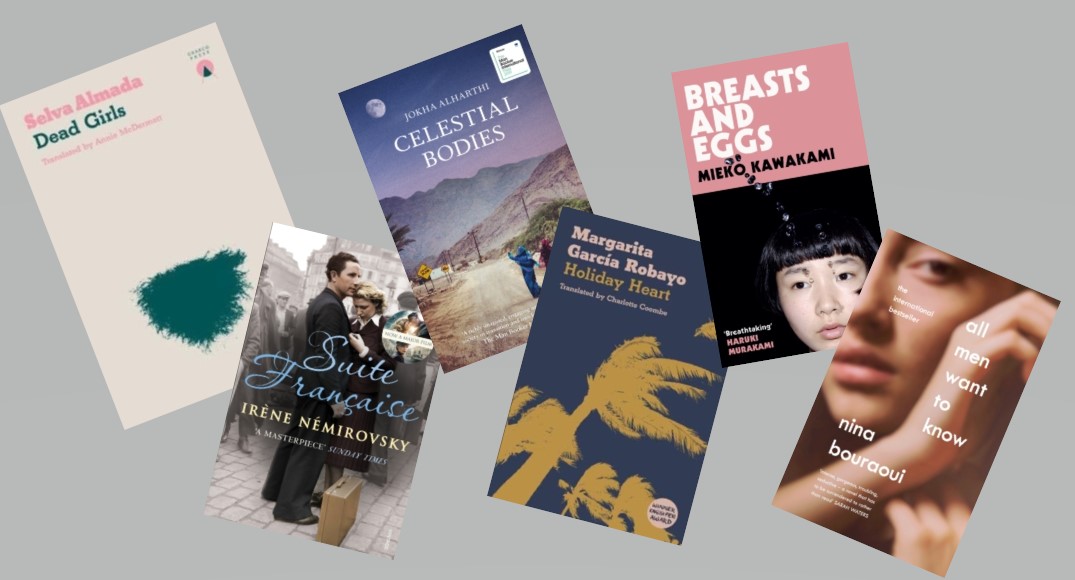Translated books have boomed in recent years through the hard work and dedication of some brilliant, innovative small publishers (Europa Editions, Fitzcarraldo, & Other Stories and Charco Press are some of our favourites) and hugely talented translators. They have provided English-language readers with essential windows into other countries, cultures and lives.
To mark Women in Translation Month 2020 I have opened up this week’s article to my esteemed colleagues, who have a whole bunch of great recommendations for you from all over the world…
My pick: Dead Girls by Selva Almada, translated by Annie McDermott: This is a stylishly written and translated slice of true crime masquerading as fiction. Part memoir, part reportage, it tells the story of three girls murdered in small Argentinian towns in the 1980s, crimes which all remain unsolved. What makes them – and this book – extraordinary, is the fact that these murders, these femicides, are not extraordinary. They are part of a diabolical trend that continues to this day.
Almada has an ice-cool, matter-of-fact style that suits the weaving of these three women’s stories with her own journey of investigation. The subject matter is heavy but the quality of her writing and the pacing of the book renders it compelling. Parts of these stories are shocking, necessarily, and there are mysteries to wonder at rather than solve. But the overwhelming feelings she draws are of outrage and, ultimately, of deep sadness that any of these killings took place.
Kate’s pick: Suite Française by Irène Némirovsky, translated by Sandra Smith: Written against the tumultuous backdrop of 1940s France, this novel was intended to make up part of a series that would sadly never be realised as Némirovsky perished in Auschwitz, leaving her work to be published by her surviving children. Following the lives of people in shell-beleaguered Paris and the Nazi-occupied countryside, Némirovsky deftly explores the consequences of greed and the limits of the human survival instinct. From a murderous group of orphaned boys in the care of a doomed priest, to the nosey cat of a bourgeois child, no stone of perspective is left unturned.
This vividly woven tapestry is given life by Némirovsky’s quiet searching prose, sudden wit, and intense scrutiny of a society in collapse. It is a poetic and forceful read that depicts the human face of conflict.
Nicole’s Pick: Celestial Bodies by Johka Alharthi, translated by Marilyn Booth: A family saga spanning several decades and two intertwining families, Alharthi’s novel explores the social and generational divides of modern Oman and changing attitudes towards love and marriage. The novel offers a fascinating insight into Oman’s recent history, including the relatively recent abolition of slavery, and the juxtaposition of ancient traditions with a rapidly modernising society.
The multitude of characters and transitions between third- and first-person narration can at times make the story difficult to follow, and some characters, such as former slave Zafira, are more colourful and memorable than others which fade into the background, but the insights into Omani culture and history are fluidly and skilfully woven.
Callum’s pick: Holiday Heart by Margarita Garcia Robayo, translated by Charlotte Coombe: Pablo and Lucia are Colombian immigrants who have forged a life in the US with their two children. After Pablo – a failed academic with illusions of writing a novel – suffers a minor heart defect brought on by excessive consumption of drugs and alcohol, Lucia takes the children away to her parents’ place in Miami. As she dissolves into the heat of the Miami landscape, Lucia’s previous life begins to wane and her children become increasingly unrecognisable.
Through Pablo and Lucia, Robayo considers the homes we are born into, the ones we create, and the great instability and uncertainty of both. With writing that fluctuates between melodic lyricism and nightmarish claustrophobia, this novel perfectly evokes the unravelling of love and exposes our corrosive potential to impose on those closest to us.
Lucinda’s pick: Breasts and Eggs by Mieko Kawakami, translated by Sam Bett and David Boyd: Set in modern-day Tokyo, this is a quirky, frank, and often funny exploration of how society places unfair judgements and demands on women.
Natsume is a struggling writer, living alone and wondering where her life is going. When older sister Makiko and niece Midoriko come to stay, things are far from rosy. Single mum Makiko makes ends meet working in a seedy hostess bar. As middle age beckons, she believes breast augmentation is the only way to prolong her career – to the horror of her adolescent daughter.
Expect searing character insights, ethical dilemmas and the odd curio about medical intervention choices!
Tess’s pick: All Men Want To Know by Nina Bouraoui, translated by Aneesa Abbas Higgins: Bouraoui’s first novel to be translated into English brings us the life of a woman trapped between a childhood spent in Algiers and her later life in Paris. Memories of a claustrophobic upbringing in the valleys around her father’s hometown overlay 1980s Paris and her coming-out as a gay woman. Nina navigates tumultuous connections as child, daughter and lover, always aware of her desperation to avoid repeating her mother’s life of violent, troubled relationships with men.
This is a sharp portrait of womanhood and a haunting novel of sexuality and identity, composed in precise, cutting prose.
For more brilliant books to celebrate Women in Translation Month, check out this list, curated by Callum.
